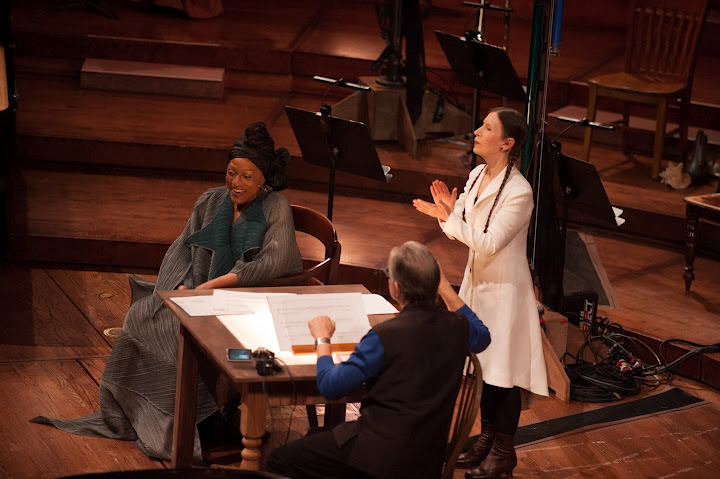Cat Calls, Cheers, and the Glories of Sound – Guest Blog by Leslie Stainton
Photo: From left to right: Jessye Norman, Michael Tilson Thomas and Meredith Monk perform in John Cage’s Song Books during the San Francisco Symphony’s American Mavericks Festival at Davies Symphony Hall in SF on March 10. Photo credit: Kristen Loken.
Editor’s Note: Lobby contributor Leslie Stainton will guest blog the San Francisco Symphony American Mavericks festival throughout this weekend. Her first post is here.
The ride—we’ve definitely moved from journey to ride—continued on Friday night with a rollicking three-hour Mavericks program that included a witty tribute to Beethoven, a tempestuous plunge into the pleasures of sirens and things that go thwack, a surprisingly lyrical piece by the same Henry Cowell who’d shattered any peace on Thursday night, and the evening’s most talked-about event—a gloriously funny, straight-from-the-Sixties, half-hour spectacle by John Cage, featuring Jessye Norman, Meredith Monk, Joan La Barbara, and Michael Tilson Thomas. The latter showed off his prowess at the blender by whipping up a smoothie. (Recipe not included.)
Here’s what Bob Wallin, who sat behind me (and is no musical slouch, being a season ticketholder at UMS, Lyric Opera, and Michigan Opera Theater), had to say about it:
Wallin wasn’t alone. When the lights fell on the last of Cage’s mania, someone in the audience began booing. It’s the first time anyone I spoke to can remember a boo in Hill Auditorium. Was he a plant? UMS’s marketing director Sara Billmann swears not, as does San Francisco Symphony’s Susan Key. So here’s my challenge: will the real booer please come forward?
Out in the lobby during intermission, I encountered Garrett Schumann, a composition student at U-M, who thought it was all great fun. He especially liked it that audience members literally stood up to the booer with cheers, thunderous applause, and a standing ovation. Here’s Schumann’s take:
I later ran into a former music buyer for Borders who felt much the same. “I mean, you come to a John Cage concert, what do you expect? It’s not as if this is 1913.”
Whatever else you thought of the Cage piece—which had to have cost a small fortune, by the way, given all the personnel and technology assembled onstage—it was a hoot to be there. A Happening in 2012 in staid Hill Auditorium? Worth every excruciating minute.
The second half of the program—Henry Cowell’s riveting “Synchrony,” with its gorgeous trumpet solo; John Adams’s aptly named “Absolute Jest,” whose opening strains made hay with Beethoven’s 9th; and Edgard Varèse’s pounding “Amériques,” with no fewer than 12 percussionists and a massive brass section—had me wanting to shout with glee as I left Hill. All through the evening, I kept thinking about sound: what we hear when we’re not really listening, how beautiful something as chilling as a siren can be, how innately musical noise is, how many magnificent and bizarre and thrilling and offputting ways humans have managed to create sound. A bass drum suspended 12 feet in the air, a bassoon played with a violin bow, a heckelphone—who knew?
By the end of the evening, even my seatmate Bob Wallin had forgotten Cage:







